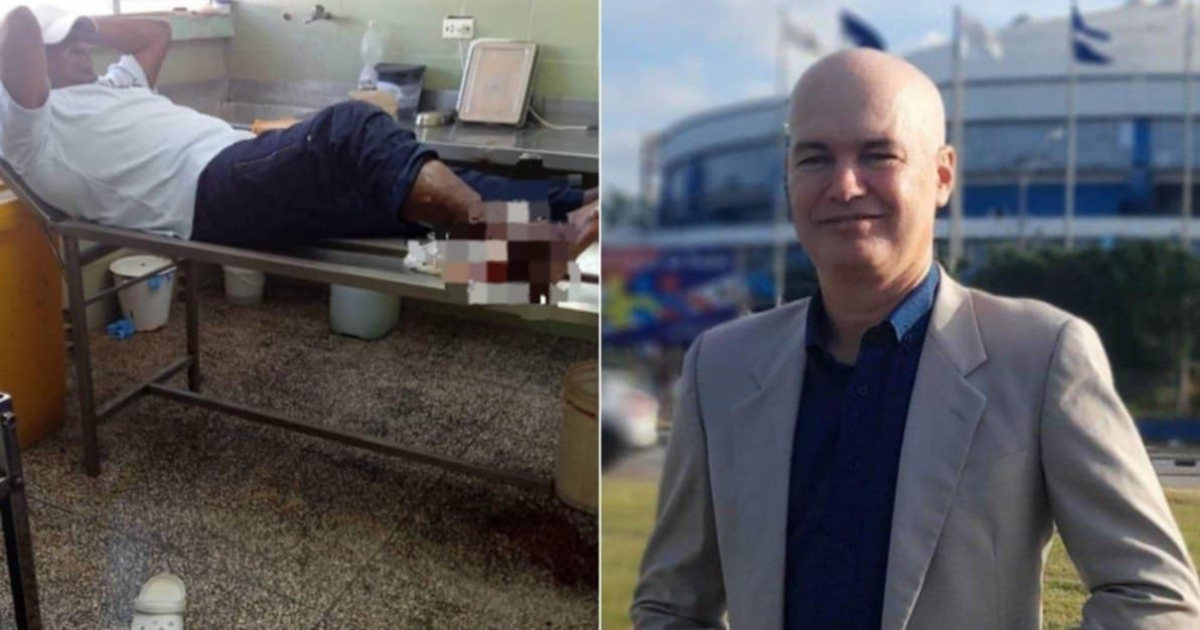The current plight of former Cuban wrestler Arturo Díaz highlights once again the disregard the Cuban regime shows towards those who once brought international sports glory to the nation. Despite the government's constant rhetoric of "sporting glory" and "eternal recognition," in reality, neglect, incompetence, and a media machine that attempts to cover up the truth are prevalent.
Díaz's situation was brought to light by his former national wrestling team colleague, Roly Dámaso, who took to social media on May 9 to report the appalling conditions in which the medalist is hospitalized in Villa Clara. "It is painful to witness the dismal state of the hospital in Villa Clara where he is being treated. The lack of hygiene is apparent, which is unfortunately common in hospitals across Cuba. It's not only the shortage of medicines but also the absence of basic sanitary conditions," Dámaso expressed.
According to the report, Díaz suffered from an incorrect medical procedure at a local clinic, worsening his condition. His wife took the initiative to transfer him to another facility, but the care remained inadequate. "The medical procedures weren't appropriate, so he had to be moved to the hospital at his wife’s request, and they are treating him there with very limited resources," Dámaso added. "It deeply saddens me to see my former national wrestling team partner, Arturo Díaz, in such a dire health situation," he continued.
Official Response and Social Media Backlash
The official response was swift. Pavel Otero, a known regime spokesperson, tried to discredit the claims, stating they were unfounded. He cited Maritza Prado, head of the Municipal Commission for Athlete Care in Santa Clara, who sent him photos supposedly showing that Arturo received necessary supplies and medication at home, along with visits from a nurse and a doctor. "It's hard, nearly impossible, for a sports hero in Santa Clara to be dissatisfied with the care provided by INDER's directors," Otero stated, notably without speaking to the sick former athlete.
Social media users quickly reacted to the journalist's post. "No Mr. Pavel, this isn't hearsay; it's reality, and that photo is old. You don't need to be a journalist to report truthfully. You failed in this article," Dámaso retorted. He also clarified, "That photo is from March. His condition worsens daily because he's been sent to a clinic without even a sheet for the stretcher, and the surroundings were disgusting. They cleaned up after the posts went public. Visit my page to learn the truth."
Voices of Dissent and Public Outcry
Criticism of Otero was direct and powerful, not only from Dámaso. "Asking officials will always yield the response that everything is fine. It's an excellent method for lazy and convenient journalism. It would be more illuminating to directly interview those affected and publish the real outcome without evasion," a singer commented.
The outrage grew with testimonies of similar cases. "Ask the ‘Misi,’ former bat boy for Villa Clara and Las Villas baseball teams, who is now old and selling boxes outside a bakery to survive," a user reported. "As Omar Ajete mentioned:... Oh right, he didn't say anything because they cut him off when he started to mention that his card had no fuel," another user quipped.
"I doubt he can be emotionally well with a house in such poor condition… it’s not even painted. This shows the dire needs he faces. Compare a video from Sandro with yours, Pavel, and observe the environment. One must learn to be observant," another commenter concluded.
Legacy Ignored
Arturo Díaz's achievements are undeniable: sixth place at the 1980 Moscow Olympics, bronze at the 1986 World Cup, gold and silver at the 1979 Pan American Games, and multiple crowns at the Central American and Caribbean Games. No Cuban athlete has repeated his feat from San Juan 1979, where he won medals in both wrestling styles: gold in Greco-Roman and silver in freestyle.
Yet, neither the State nor its official media have been able to acknowledge his decline or ensure he receives dignified medical care. "The Cuban system is collapsing and is dragging the courageous Cuban people down with it. I want to emphasize a statement that encapsulates the current reality of Cuba: The Cuban socialist system is a failed, irreparable, and obsolete form of government," Dámaso declared.
Arturo Díaz's story is not isolated but rather a reflection of a systematic reality: a country where yesterday’s sports heroes live today in oblivion, and where truth, like dignity, is being erased by those who should reveal it.
Understanding the Decline of Cuban Sports Heroes
What is the current situation of former Cuban wrestler Arturo Díaz?
Arturo Díaz is facing serious health issues in inadequate hospital conditions, exposing the neglect of former sports heroes by the Cuban regime.
How did the Cuban government respond to the allegations about Díaz’s treatment?
The government, through Pavel Otero, downplayed the allegations, claiming Díaz was receiving proper care and supplies, despite evidence to the contrary.
What impact did Roly Dámaso’s social media post have?
Dámaso's post sparked widespread outrage and brought attention to the neglect of former athletes, challenging the regime's narrative of adequate care.
